Analyzing Motivation Techniques at Jack Stores (TESCO) Case Study
VerifiedAdded on 2023/01/16
|6
|1243
|39
Case Study
AI Summary
This case study analyzes the application of motivational theories within Jack Stores, a discount venture launched by TESCO to compete in the UK retail market. The assignment begins with an introduction to motivation, its significance, and the importance of employee engagement for organizational success. It then delves into two key motivational theories: Maslow's Hierarchy of Needs and Adam's Equity Theory. The case study explains how Jack Stores can apply these theories to meet employee needs and ensure equitable treatment, aiming to enhance employee performance, boost productivity, and maintain a competitive edge. The analysis includes practical examples of implementing these theories, such as providing adequate salaries, offering insurance, fostering social connections, recognizing achievements, and investing in employee development. The conclusion emphasizes the critical role of motivation in driving organizational success and the effectiveness of these theories in achieving that goal.
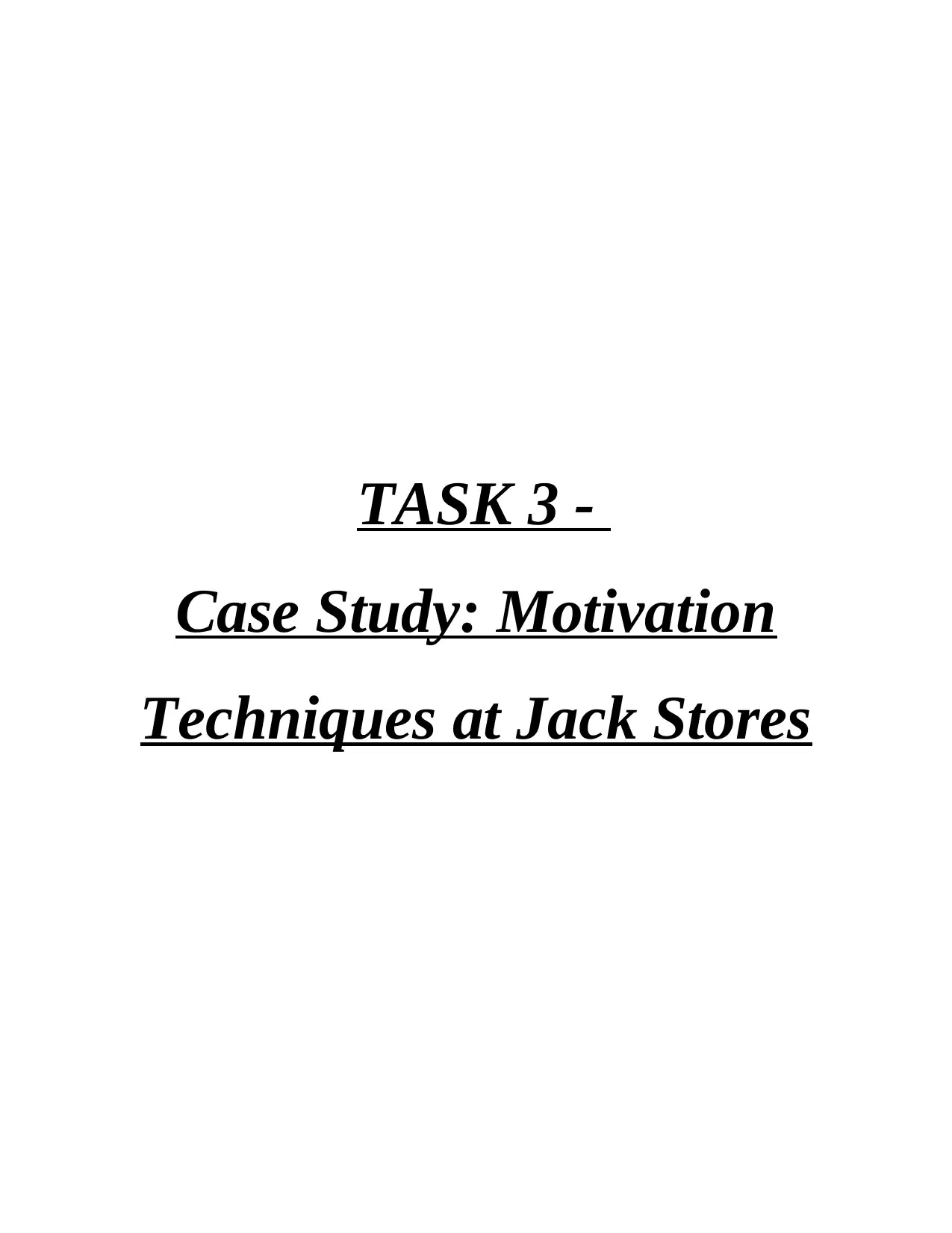
TASK 3 -
Case Study: Motivation
Techniques at Jack Stores
Case Study: Motivation
Techniques at Jack Stores
Paraphrase This Document
Need a fresh take? Get an instant paraphrase of this document with our AI Paraphraser
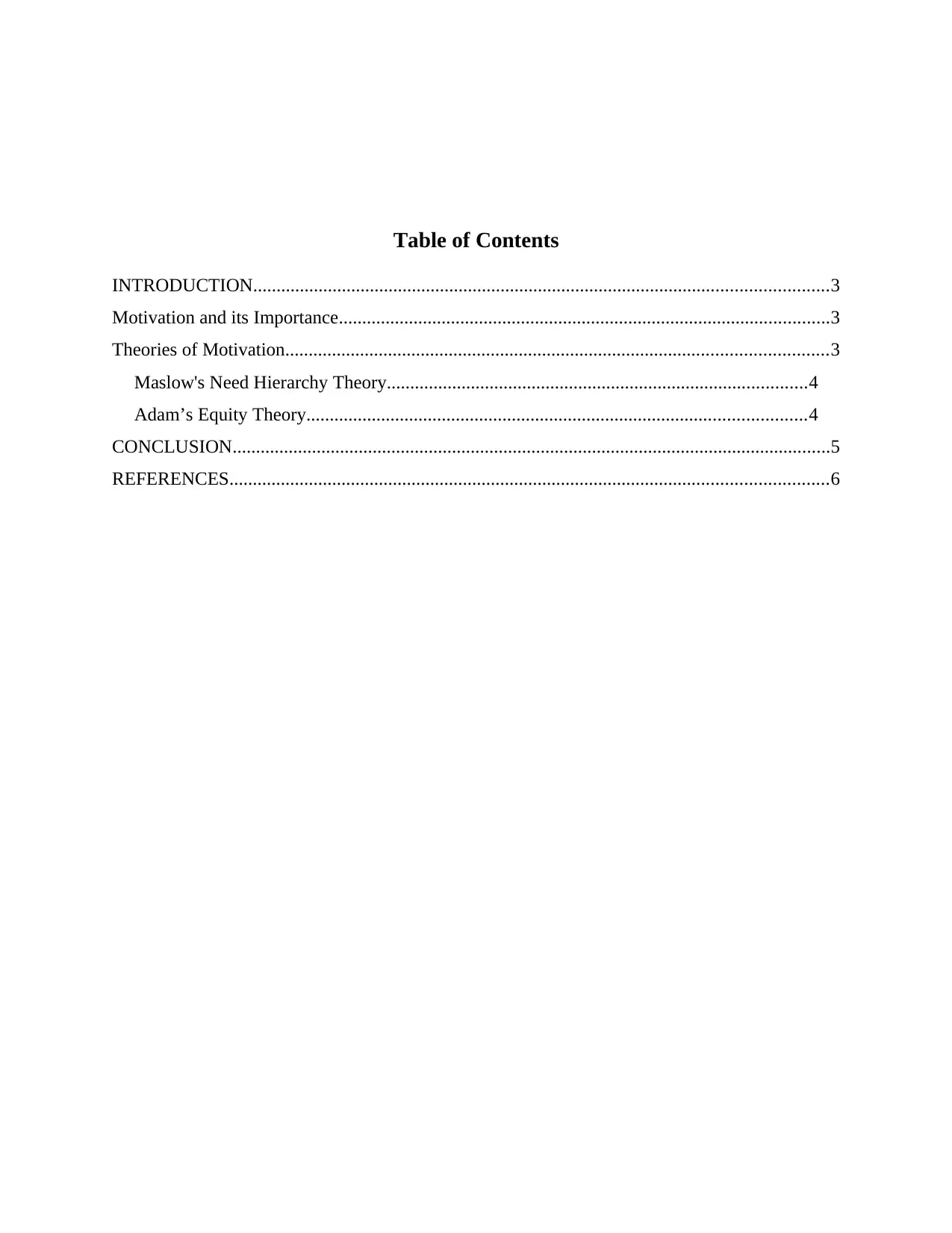
Table of Contents
INTRODUCTION...........................................................................................................................3
Motivation and its Importance.........................................................................................................3
Theories of Motivation....................................................................................................................3
Maslow's Need Hierarchy Theory..........................................................................................4
Adam’s Equity Theory...........................................................................................................4
CONCLUSION................................................................................................................................5
REFERENCES................................................................................................................................6
INTRODUCTION...........................................................................................................................3
Motivation and its Importance.........................................................................................................3
Theories of Motivation....................................................................................................................3
Maslow's Need Hierarchy Theory..........................................................................................4
Adam’s Equity Theory...........................................................................................................4
CONCLUSION................................................................................................................................5
REFERENCES................................................................................................................................6
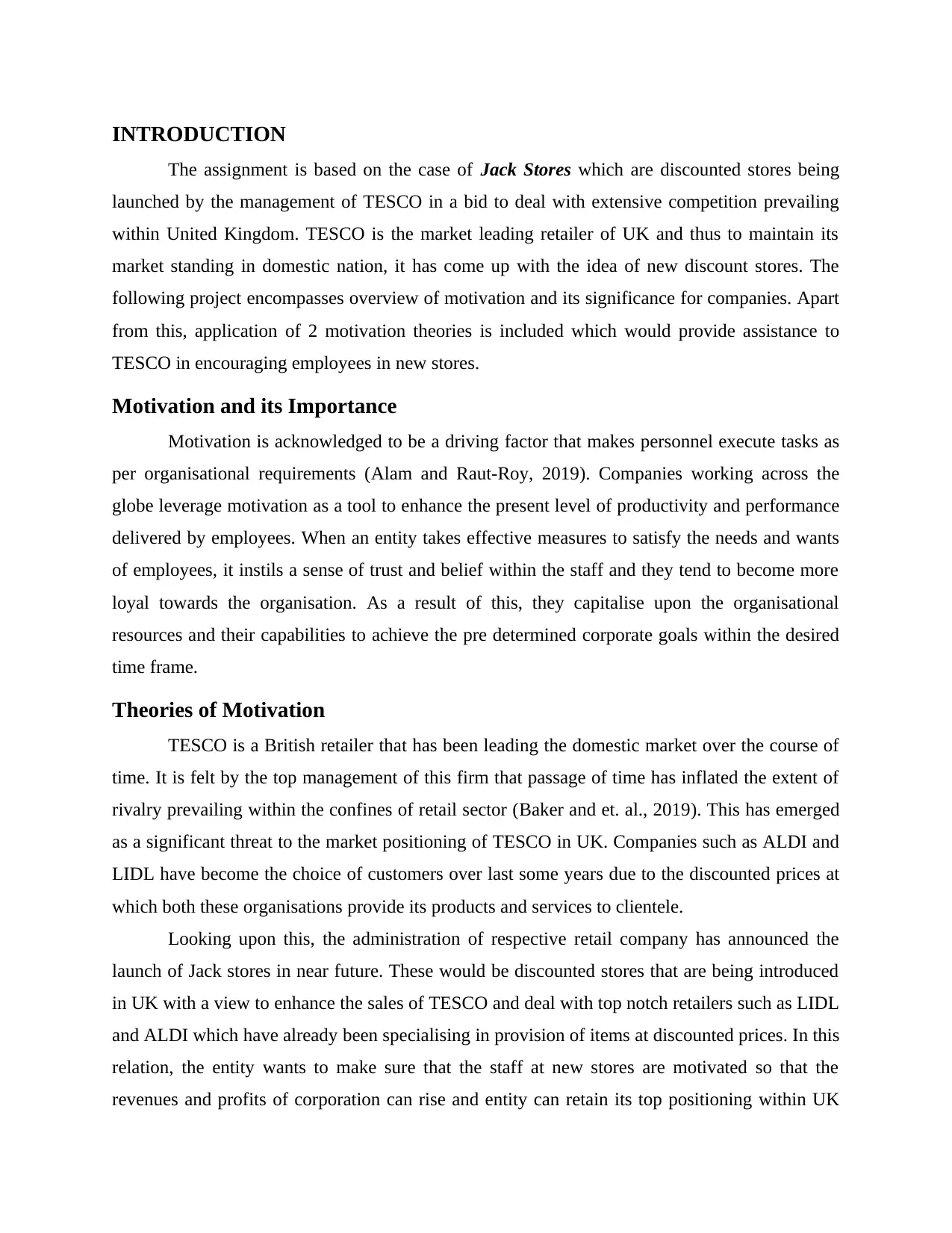
INTRODUCTION
The assignment is based on the case of Jack Stores which are discounted stores being
launched by the management of TESCO in a bid to deal with extensive competition prevailing
within United Kingdom. TESCO is the market leading retailer of UK and thus to maintain its
market standing in domestic nation, it has come up with the idea of new discount stores. The
following project encompasses overview of motivation and its significance for companies. Apart
from this, application of 2 motivation theories is included which would provide assistance to
TESCO in encouraging employees in new stores.
Motivation and its Importance
Motivation is acknowledged to be a driving factor that makes personnel execute tasks as
per organisational requirements (Alam and Raut-Roy, 2019). Companies working across the
globe leverage motivation as a tool to enhance the present level of productivity and performance
delivered by employees. When an entity takes effective measures to satisfy the needs and wants
of employees, it instils a sense of trust and belief within the staff and they tend to become more
loyal towards the organisation. As a result of this, they capitalise upon the organisational
resources and their capabilities to achieve the pre determined corporate goals within the desired
time frame.
Theories of Motivation
TESCO is a British retailer that has been leading the domestic market over the course of
time. It is felt by the top management of this firm that passage of time has inflated the extent of
rivalry prevailing within the confines of retail sector (Baker and et. al., 2019). This has emerged
as a significant threat to the market positioning of TESCO in UK. Companies such as ALDI and
LIDL have become the choice of customers over last some years due to the discounted prices at
which both these organisations provide its products and services to clientele.
Looking upon this, the administration of respective retail company has announced the
launch of Jack stores in near future. These would be discounted stores that are being introduced
in UK with a view to enhance the sales of TESCO and deal with top notch retailers such as LIDL
and ALDI which have already been specialising in provision of items at discounted prices. In this
relation, the entity wants to make sure that the staff at new stores are motivated so that the
revenues and profits of corporation can rise and entity can retain its top positioning within UK
The assignment is based on the case of Jack Stores which are discounted stores being
launched by the management of TESCO in a bid to deal with extensive competition prevailing
within United Kingdom. TESCO is the market leading retailer of UK and thus to maintain its
market standing in domestic nation, it has come up with the idea of new discount stores. The
following project encompasses overview of motivation and its significance for companies. Apart
from this, application of 2 motivation theories is included which would provide assistance to
TESCO in encouraging employees in new stores.
Motivation and its Importance
Motivation is acknowledged to be a driving factor that makes personnel execute tasks as
per organisational requirements (Alam and Raut-Roy, 2019). Companies working across the
globe leverage motivation as a tool to enhance the present level of productivity and performance
delivered by employees. When an entity takes effective measures to satisfy the needs and wants
of employees, it instils a sense of trust and belief within the staff and they tend to become more
loyal towards the organisation. As a result of this, they capitalise upon the organisational
resources and their capabilities to achieve the pre determined corporate goals within the desired
time frame.
Theories of Motivation
TESCO is a British retailer that has been leading the domestic market over the course of
time. It is felt by the top management of this firm that passage of time has inflated the extent of
rivalry prevailing within the confines of retail sector (Baker and et. al., 2019). This has emerged
as a significant threat to the market positioning of TESCO in UK. Companies such as ALDI and
LIDL have become the choice of customers over last some years due to the discounted prices at
which both these organisations provide its products and services to clientele.
Looking upon this, the administration of respective retail company has announced the
launch of Jack stores in near future. These would be discounted stores that are being introduced
in UK with a view to enhance the sales of TESCO and deal with top notch retailers such as LIDL
and ALDI which have already been specialising in provision of items at discounted prices. In this
relation, the entity wants to make sure that the staff at new stores are motivated so that the
revenues and profits of corporation can rise and entity can retain its top positioning within UK
⊘ This is a preview!⊘
Do you want full access?
Subscribe today to unlock all pages.

Trusted by 1+ million students worldwide
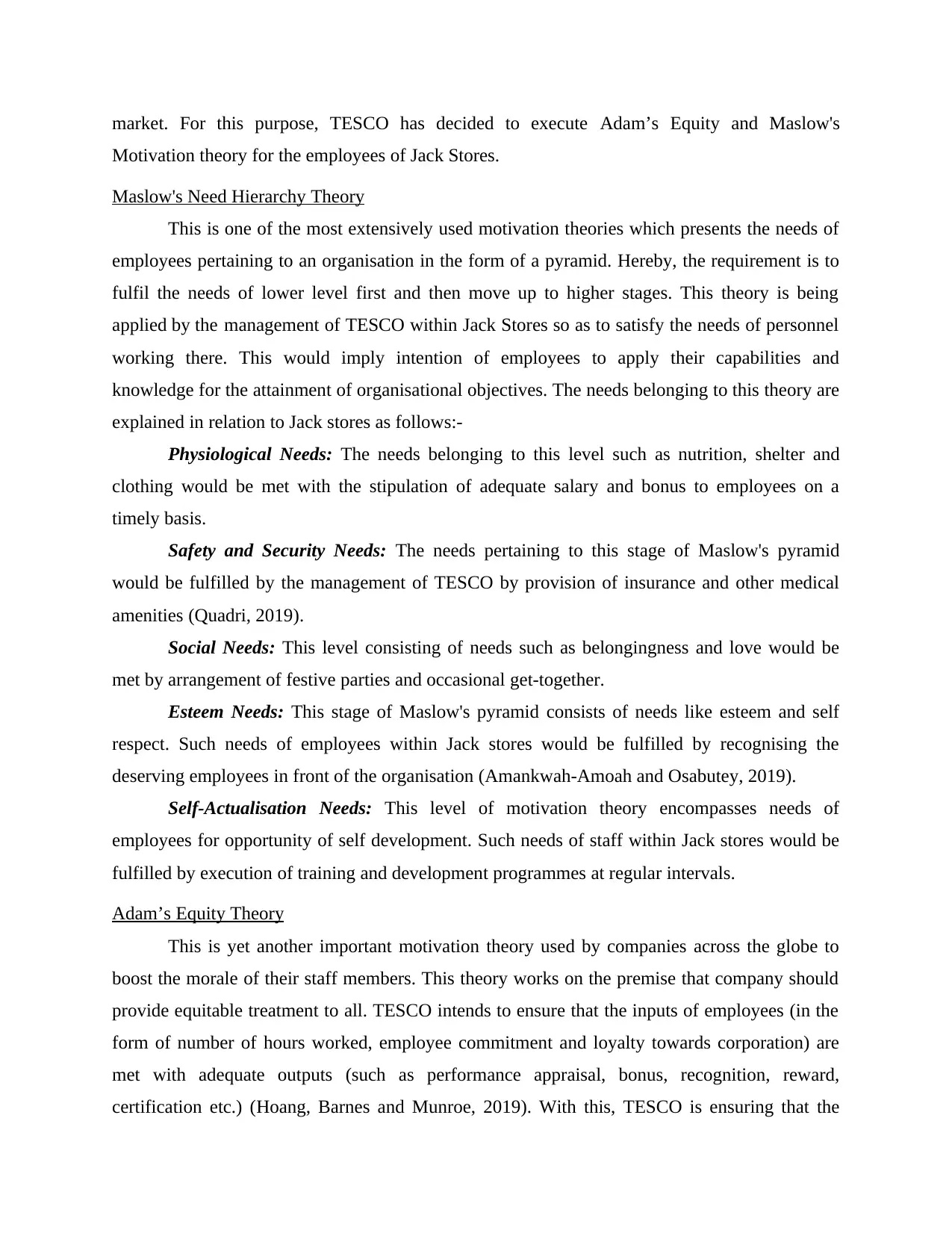
market. For this purpose, TESCO has decided to execute Adam’s Equity and Maslow's
Motivation theory for the employees of Jack Stores.
Maslow's Need Hierarchy Theory
This is one of the most extensively used motivation theories which presents the needs of
employees pertaining to an organisation in the form of a pyramid. Hereby, the requirement is to
fulfil the needs of lower level first and then move up to higher stages. This theory is being
applied by the management of TESCO within Jack Stores so as to satisfy the needs of personnel
working there. This would imply intention of employees to apply their capabilities and
knowledge for the attainment of organisational objectives. The needs belonging to this theory are
explained in relation to Jack stores as follows:-
Physiological Needs: The needs belonging to this level such as nutrition, shelter and
clothing would be met with the stipulation of adequate salary and bonus to employees on a
timely basis.
Safety and Security Needs: The needs pertaining to this stage of Maslow's pyramid
would be fulfilled by the management of TESCO by provision of insurance and other medical
amenities (Quadri, 2019).
Social Needs: This level consisting of needs such as belongingness and love would be
met by arrangement of festive parties and occasional get-together.
Esteem Needs: This stage of Maslow's pyramid consists of needs like esteem and self
respect. Such needs of employees within Jack stores would be fulfilled by recognising the
deserving employees in front of the organisation (Amankwah-Amoah and Osabutey, 2019).
Self-Actualisation Needs: This level of motivation theory encompasses needs of
employees for opportunity of self development. Such needs of staff within Jack stores would be
fulfilled by execution of training and development programmes at regular intervals.
Adam’s Equity Theory
This is yet another important motivation theory used by companies across the globe to
boost the morale of their staff members. This theory works on the premise that company should
provide equitable treatment to all. TESCO intends to ensure that the inputs of employees (in the
form of number of hours worked, employee commitment and loyalty towards corporation) are
met with adequate outputs (such as performance appraisal, bonus, recognition, reward,
certification etc.) (Hoang, Barnes and Munroe, 2019). With this, TESCO is ensuring that the
Motivation theory for the employees of Jack Stores.
Maslow's Need Hierarchy Theory
This is one of the most extensively used motivation theories which presents the needs of
employees pertaining to an organisation in the form of a pyramid. Hereby, the requirement is to
fulfil the needs of lower level first and then move up to higher stages. This theory is being
applied by the management of TESCO within Jack Stores so as to satisfy the needs of personnel
working there. This would imply intention of employees to apply their capabilities and
knowledge for the attainment of organisational objectives. The needs belonging to this theory are
explained in relation to Jack stores as follows:-
Physiological Needs: The needs belonging to this level such as nutrition, shelter and
clothing would be met with the stipulation of adequate salary and bonus to employees on a
timely basis.
Safety and Security Needs: The needs pertaining to this stage of Maslow's pyramid
would be fulfilled by the management of TESCO by provision of insurance and other medical
amenities (Quadri, 2019).
Social Needs: This level consisting of needs such as belongingness and love would be
met by arrangement of festive parties and occasional get-together.
Esteem Needs: This stage of Maslow's pyramid consists of needs like esteem and self
respect. Such needs of employees within Jack stores would be fulfilled by recognising the
deserving employees in front of the organisation (Amankwah-Amoah and Osabutey, 2019).
Self-Actualisation Needs: This level of motivation theory encompasses needs of
employees for opportunity of self development. Such needs of staff within Jack stores would be
fulfilled by execution of training and development programmes at regular intervals.
Adam’s Equity Theory
This is yet another important motivation theory used by companies across the globe to
boost the morale of their staff members. This theory works on the premise that company should
provide equitable treatment to all. TESCO intends to ensure that the inputs of employees (in the
form of number of hours worked, employee commitment and loyalty towards corporation) are
met with adequate outputs (such as performance appraisal, bonus, recognition, reward,
certification etc.) (Hoang, Barnes and Munroe, 2019). With this, TESCO is ensuring that the
Paraphrase This Document
Need a fresh take? Get an instant paraphrase of this document with our AI Paraphraser
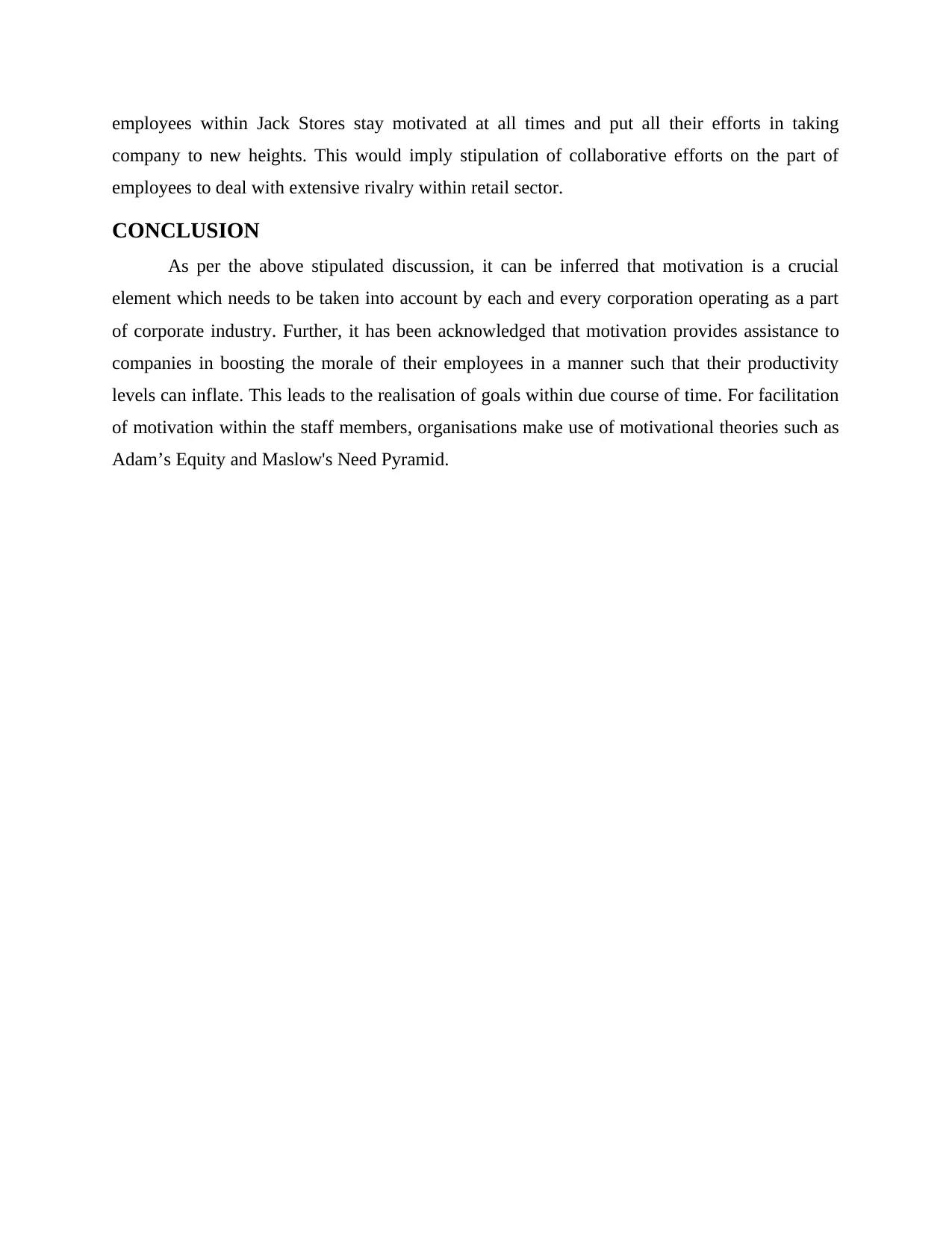
employees within Jack Stores stay motivated at all times and put all their efforts in taking
company to new heights. This would imply stipulation of collaborative efforts on the part of
employees to deal with extensive rivalry within retail sector.
CONCLUSION
As per the above stipulated discussion, it can be inferred that motivation is a crucial
element which needs to be taken into account by each and every corporation operating as a part
of corporate industry. Further, it has been acknowledged that motivation provides assistance to
companies in boosting the morale of their employees in a manner such that their productivity
levels can inflate. This leads to the realisation of goals within due course of time. For facilitation
of motivation within the staff members, organisations make use of motivational theories such as
Adam’s Equity and Maslow's Need Pyramid.
company to new heights. This would imply stipulation of collaborative efforts on the part of
employees to deal with extensive rivalry within retail sector.
CONCLUSION
As per the above stipulated discussion, it can be inferred that motivation is a crucial
element which needs to be taken into account by each and every corporation operating as a part
of corporate industry. Further, it has been acknowledged that motivation provides assistance to
companies in boosting the morale of their employees in a manner such that their productivity
levels can inflate. This leads to the realisation of goals within due course of time. For facilitation
of motivation within the staff members, organisations make use of motivational theories such as
Adam’s Equity and Maslow's Need Pyramid.
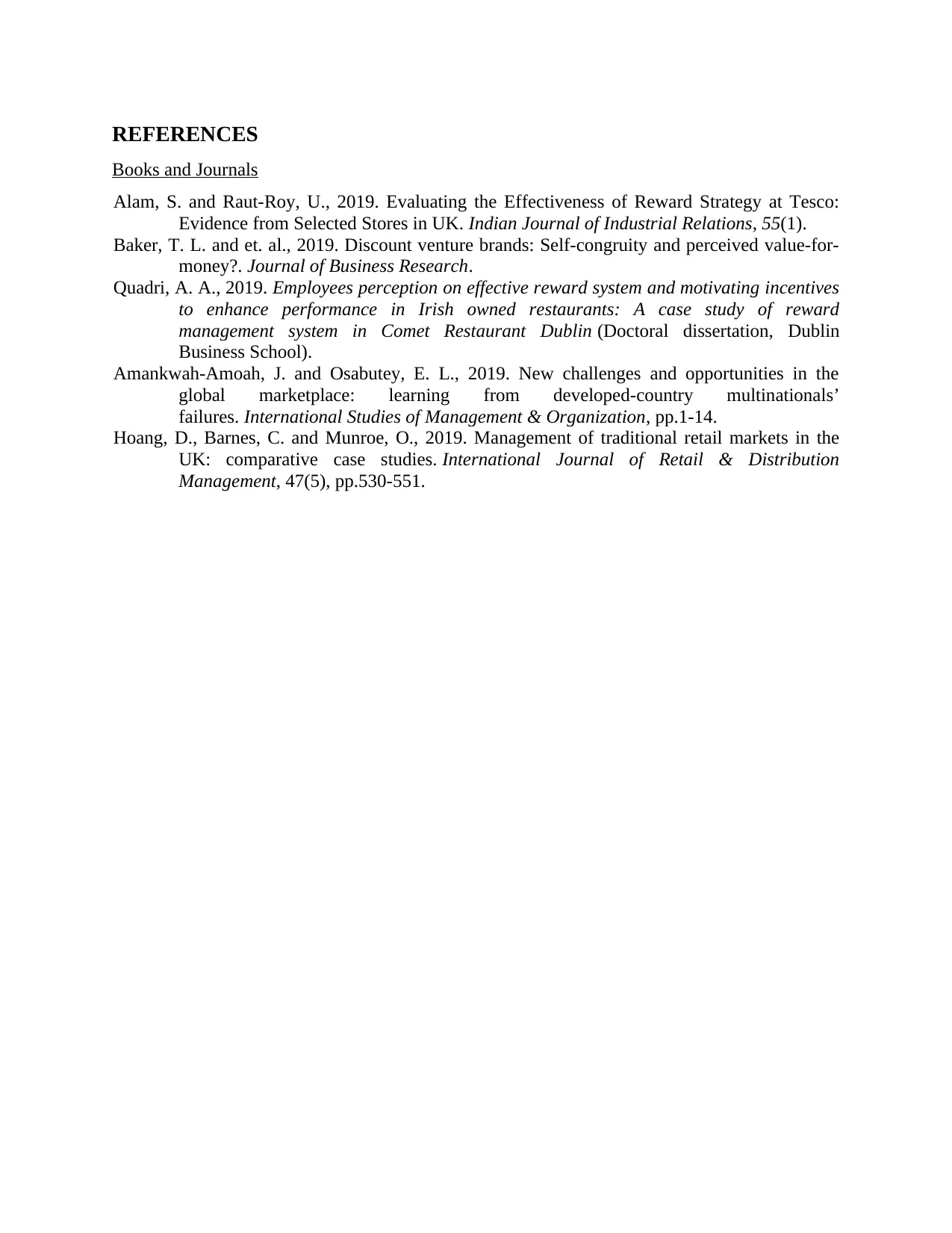
REFERENCES
Books and Journals
Alam, S. and Raut-Roy, U., 2019. Evaluating the Effectiveness of Reward Strategy at Tesco:
Evidence from Selected Stores in UK. Indian Journal of Industrial Relations, 55(1).
Baker, T. L. and et. al., 2019. Discount venture brands: Self-congruity and perceived value-for-
money?. Journal of Business Research.
Quadri, A. A., 2019. Employees perception on effective reward system and motivating incentives
to enhance performance in Irish owned restaurants: A case study of reward
management system in Comet Restaurant Dublin (Doctoral dissertation, Dublin
Business School).
Amankwah-Amoah, J. and Osabutey, E. L., 2019. New challenges and opportunities in the
global marketplace: learning from developed-country multinationals’
failures. International Studies of Management & Organization, pp.1-14.
Hoang, D., Barnes, C. and Munroe, O., 2019. Management of traditional retail markets in the
UK: comparative case studies. International Journal of Retail & Distribution
Management, 47(5), pp.530-551.
Books and Journals
Alam, S. and Raut-Roy, U., 2019. Evaluating the Effectiveness of Reward Strategy at Tesco:
Evidence from Selected Stores in UK. Indian Journal of Industrial Relations, 55(1).
Baker, T. L. and et. al., 2019. Discount venture brands: Self-congruity and perceived value-for-
money?. Journal of Business Research.
Quadri, A. A., 2019. Employees perception on effective reward system and motivating incentives
to enhance performance in Irish owned restaurants: A case study of reward
management system in Comet Restaurant Dublin (Doctoral dissertation, Dublin
Business School).
Amankwah-Amoah, J. and Osabutey, E. L., 2019. New challenges and opportunities in the
global marketplace: learning from developed-country multinationals’
failures. International Studies of Management & Organization, pp.1-14.
Hoang, D., Barnes, C. and Munroe, O., 2019. Management of traditional retail markets in the
UK: comparative case studies. International Journal of Retail & Distribution
Management, 47(5), pp.530-551.
⊘ This is a preview!⊘
Do you want full access?
Subscribe today to unlock all pages.

Trusted by 1+ million students worldwide
1 out of 6
Related Documents
Your All-in-One AI-Powered Toolkit for Academic Success.
+13062052269
info@desklib.com
Available 24*7 on WhatsApp / Email
![[object Object]](/_next/static/media/star-bottom.7253800d.svg)
Unlock your academic potential
Copyright © 2020–2026 A2Z Services. All Rights Reserved. Developed and managed by ZUCOL.





